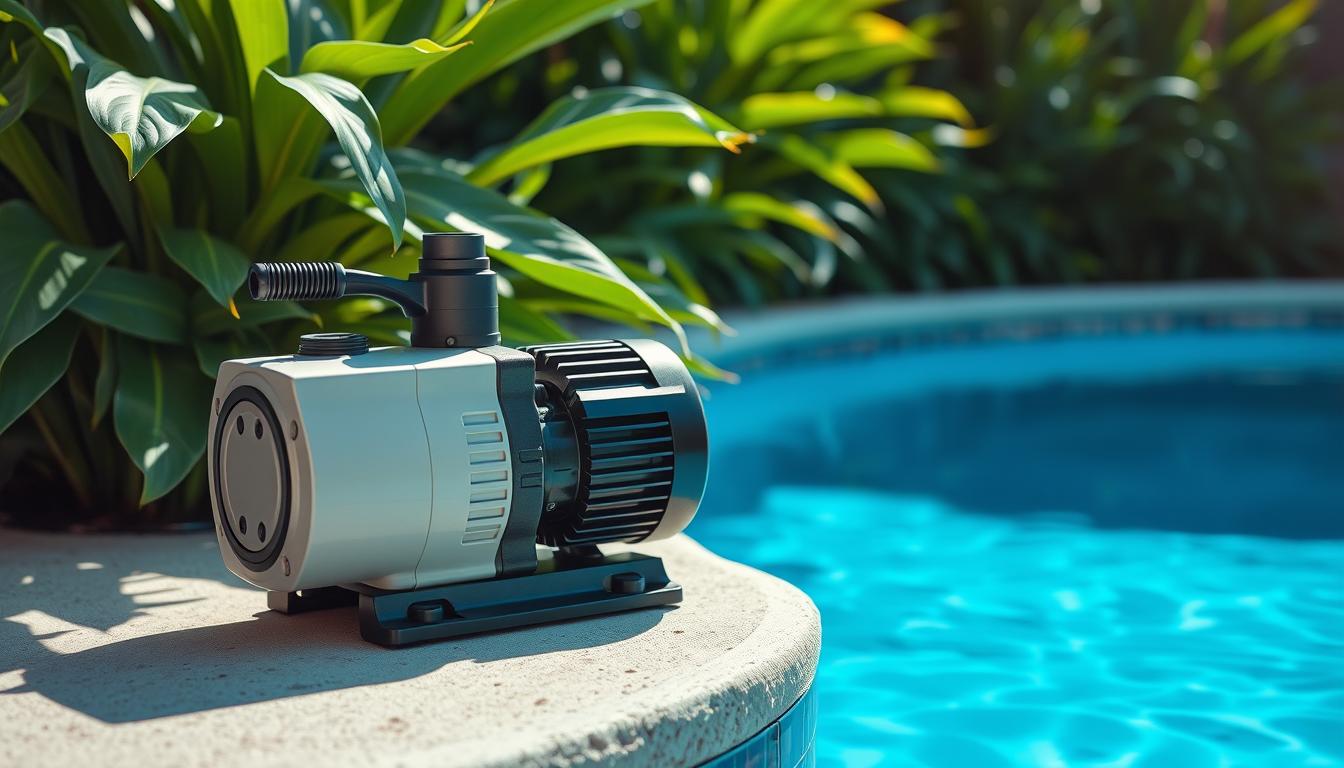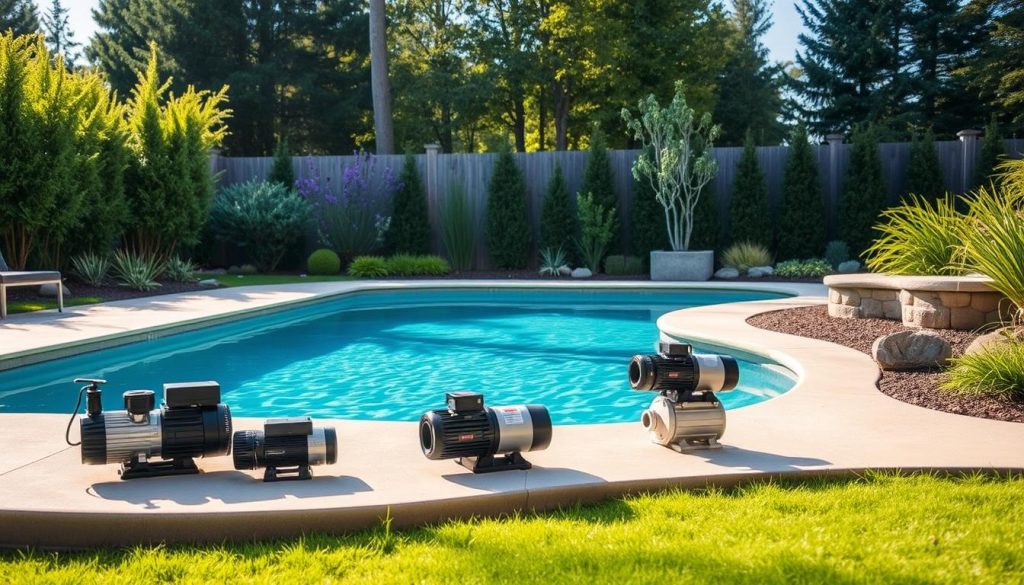
Summer’s here, and it’s time to enjoy our backyard pools. The pool pump works hard to keep the water clean and safe. Let’s explore how long pool pumps last and when to replace them.
Pool pumps wear out over time due to use, maintenance, and environment. A well-maintained pump can last 8 to 12 years. Some high-quality models may even last longer.
Regular maintenance is key to maximizing your pool pump’s lifespan. It ensures optimal performance and longevity.
We’ll explore factors that affect pool pump durability and efficiency. We’ll discuss average lifespans of different pump types, including inground and above ground models.
You’ll learn how to extend your pump’s life through proper care. We’ll also cover signs that indicate it’s time for a replacement.
Let’s dive in and discover how to keep your pool pump running smoothly for years.
Factors Affecting Pool Pump Lifespan
Pool pump longevity depends on several key factors. These include pump quality, usage, pool size, maintenance, and environmental conditions. Understanding these can help you choose and care for your pool pump wisely.
Quality and Brand of the Pump
High-quality pumps often last longer due to better materials and technology. Brands like Hayward and Pentair are known for durability. They usually offer extended warranties, showing confidence in their products’ longevity.
Usage Frequency and Pool Size
Larger pools and frequent use can shorten a pump’s lifespan. Most pumps should run about 8 hours daily. This maintains proper water circulation and filtration.
Runtime may vary based on pool volume and pump size. The overall condition of the pool also plays a role.
Maintenance and Care
Regular upkeep is vital for extending a pool pump’s life. Clean the pump basket and check for leaks often. Ensure the motor performs optimally to prolong the pump’s lifespan.
Inspect pool pumps bi-monthly to clean the impeller and flush the housing. An annual professional check is recommended. This helps assess the motor, electrical connections, and internal components.
Well-maintained pool pumps can last between 8 to 12 years, while high-quality models may last longer with correct care.
Environmental Conditions
Weather and chemical exposure can affect a pool pump’s longevity. Extreme temperatures may damage pump components. Imbalanced pool chemicals can cause corrosion and deterioration.
Winterize your pool pump during off-season to minimize risks. Maintain balanced chemical composition in your pool water year-round.
| Factor | Impact on Lifespan |
|---|---|
| Quality and Brand | High-quality brands like Hayward and Pentair offer durable pumps that can last 8-12 years or longer with proper care. |
| Usage Frequency | More frequent use leads to increased wear and tear, potentially shortening the pump’s lifespan. |
| Maintenance | Regular maintenance, such as cleaning the pump basket and inspecting components, can significantly extend the pump’s life. |
| Environmental Conditions | Extreme temperatures and improper chemical balance can cause damage to the pump’s components, reducing its lifespan. |
Average Lifespan of Different Pool Pump Types
Pool pump lifespans vary based on their type, design, and materials. Let’s explore the average lifespans of inground, above ground, and variable speed pumps.

Inground Pool Pumps
Inground pool pumps are built tough for larger pools. They use durable materials and high-quality parts. With proper care, these pumps can last 8 to 15 years.
Factors like pump quality, usage, and environment can affect their lifespan. Regular maintenance is key to maximizing their durability.
Above Ground Pool Pumps
Above ground pool pumps are made for smaller pools. They face less stress than inground pumps. These pumps typically last 6 to 10 years.
Regular check-ups and timely fixes can extend their life. Proper care ensures reliable performance for years.
Variable Speed Pumps
Variable speed pumps are energy-efficient and adaptable. They adjust speed based on pool needs, reducing motor wear. These pumps can last 12 to 15 years or more.
Their longer lifespan makes them a great investment. They offer efficiency and durability for pool owners.
| Pool Pump Type | Average Lifespan |
|---|---|
| Inground Pool Pumps | 8-15 years |
| Above Ground Pool Pumps | 6-10 years |
| Variable Speed Pumps | 12-15 years or more |
Remember, these are average lifespans. Actual pump life can vary. Factors like maintenance, usage, and environment play a role.
Invest in quality pumps and perform regular upkeep. Address issues quickly to extend your pool pump’s life.
Signs It’s Time to Replace Your Pool Pump
Recognizing when to replace your pool pump is crucial for pool owners. Addressing issues promptly maintains optimal efficiency and prevents costly breakdowns. Here are key indicators suggesting your pool pump needs replacement:
Decreased Water Flow and Circulation
A significant drop in water flow might mean your pump is struggling. Poor circulation can lead to stagnant water, promoting algae and bacteria growth. This compromises pool cleanliness and strains your pump.
Reduced water flow may result in a premature need for pump replacement. It’s important to address these issues quickly to maintain pool health.
Unusual Noises or Vibrations
Strange noises or excessive vibrations from your pool pump signal trouble. These sounds can include grinding, screeching, humming, or rattling. They often indicate worn-out bearings, damaged motor components, or cavitation issues.
Ignoring these warning signs can lead to further pump damage. This might necessitate an earlier replacement than expected.
Increased Energy Bills
A sudden spike in energy bills may suggest your pump isn’t working efficiently. Older pumps often use more energy to maintain performance. Investing in a newer, energy-efficient model can save money long-term.
Modern pumps are typically more eco-friendly. They contribute to sustainable pool maintenance practices while reducing utility costs.
According to industry experts, newer pool pump models are typically more energy-efficient, resulting in long-term cost savings on utility bills.
Frequent Repairs and Breakdowns
Constant repairs or recurring breakdowns might mean it’s time for a new pump. Consider these factors when deciding between repair and replacement:
- The cost of repairs should not exceed 50% of the price of a new pump.
- Multiple repairs within a short period suggest a failing pump, indicating that investing in a new pump can be more economical.
- The availability of replacement parts for older pump models is a factor to consider when deciding between repair and replacement.
| Factor | Repair | Replace |
|---|---|---|
| Cost | Less than 50% of new pump price | More than 50% of new pump price |
| Frequency | Occasional repairs | Multiple repairs in a short period |
| Parts Availability | Readily available | Difficult to find for older models |
Watch for these warning signs and maintain your pool pump properly. This will help extend its lifespan and ensure a clean, safe swimming experience. Regular maintenance contributes to years of enjoyable pool use.
How Long Should a Pool Pump Last?
Pool pumps typically last 8-12 years. Their lifespan depends on quality, usage, and maintenance. Single speed and variable speed pumps are the main types available.
Variable speed pumps are more energy-efficient but cost more upfront. Regular maintenance can extend your pump’s life and ensure optimal performance.
Aging pumps may show signs of needed replacement. These include unusual noises, reduced water flow, leaks, and higher energy bills.
Upgrading to an energy-efficient model can lower operating costs. It’s important to address issues quickly to avoid complete pump failure.
DIY pump replacements might seem cost-effective but carry risks. These include electrocution and fire hazards.
Professional replacement services offer access to the latest technology and expertise. Swimming pool technicians are trained and up-to-date on industry standards.
Investing in a quality pump and following proper maintenance can maximize its lifespan. This ensures a well-functioning pool for years to come.







